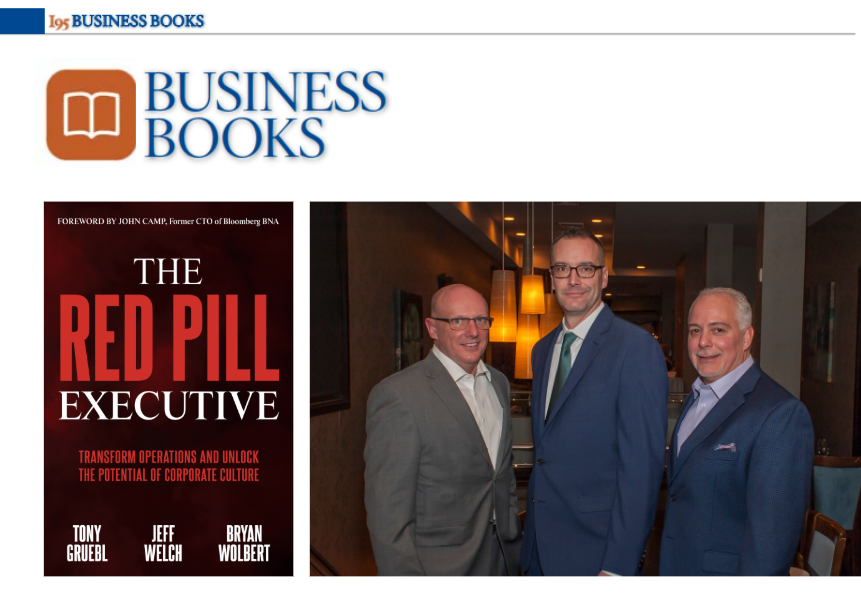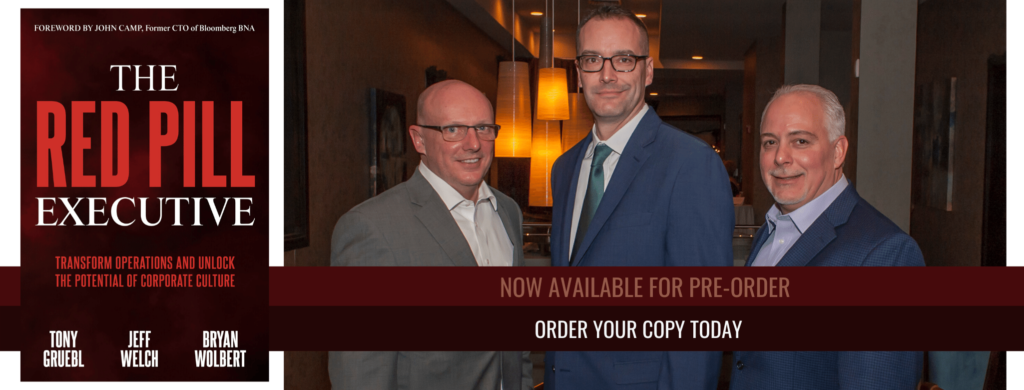Brain Science, Hollywood and Business Operations

Why You Should Binge on Pop Culture to Unlock the Future of Business Operations
What can you learn about business operations from 20-year old pop culture phenomena like the movie The Matrix? Are there really lessons that seasoned operations executives and up and coming next generation managers can learn from Pulp Fiction, Jaws, Sully or The Edge of Tomorrow? Get ready for a Netflix weekend binge because when mixed with hard science, serious transformation opportunities exist for businesses that figure it out.
“This is your last chance. After this, there is no turning back. You take the blue pill—the story ends, you wake up in your bed and believe whatever you want to believe. You take the red pill—you stay in Wonderland and I show you how deep the rabbit hole goes.”
– Morpheus, The Matrix, 1999.
Consider the idea that we have two brains. Not the right- and left-brain classification we’ve all grown accustomed to, but rather a first and second brain (old and new). Nearly all the tools, business processes and education we use to develop ourselves focuses on the second brain, the one that evolved to make us human and the one that makes us great operating executives.
Now here’s the kicker. Very few people have had the life experiences to properly develop our first brain for business. That’s the one that contains our emotion and our values. It also defines a company’s Culture, causes conflict and propels success.
When was the last time you became emotional while reading a business book? It shouldn’t surprise you that those books are written for your new brain, your human brain, not your old brain. The few pages that evoked an emotional response were the pages you dog-eared and promised to go back and read again. Can you remember a time you watched a movie and thought about it for days? That movie challenged your working model of the world, was created for your old brain, and was likely full of things that your human brain had to ignore to make it more believable. This is the power of pop culture. It’s storytelling, the oldest knowledge transfer method known to humanity.
For executives responsible for running businesses, years of practice and experience have gone into their training. They’ve invested heavily in their human brain and all of the logic, information recall, language, math and analytic capabilities needed to make sharp, proficient operators and leaders. But there’s a cost, and most are blind to it.
Big thinkers like Dr. Daniel Kahneman (Thinking Fast and Slow, 2011), Oren Klaff (Pitch Anything, 2011) and Simon Sinek (Start with Why, 2009) have explained how biology can lock most operators, even seasoned executives, into a way of thinking that prevents them achieving their greatest potential. These thought leaders understand brain science at both a biological and social level, and their books are all best sellers. Ironically, it turns out that great operators are so good at using tools and techniques to work within their operationally focused world, they become blind to the one thing that controls everything they do. That thing is Culture.
It’s not an integrated concept at fits neatly into the part of the brain that makes for great operators. As a result, operators have a propensity to turn a blind eye to what they experience outside of their purely operational framework. At the extreme, many of them are so inert, so hopelessly dependent on the system that they will fight to protect it even if it doesn’t make any sense (emphasis a direct quote from that sage, Morpheus). Certainly, things can’t be better than industry norms. Or could they be?
Kahneman, Klaff and Sinek say that it takes a special combination of circumstances, environmental conditions and biochemistry to unlock and rewire thinking. But this magic combination has never been pointed toward what business schools and professional institutions have spent decades hard wiring into our Operating Executives. Until now.
The Red Pill Executive – to be released by Morgan James Publishing, New York, later this year – reveals the evidence of this problem all around us; it exists in every company, big or small, private or public. One of the most significant indicators, project failure rates, some so serious that they threaten the very existence companies, hover around 70%. That statistic has endured for decades. Projects are typically the domain of operations and represent how Operating Executives view the world. Every project is a microcosm of how company operations, technology and culture intersect.
Blue Pill operators and executives ignore culture or have a simplistic two dimensional view of its breadth and impact. Taking the red pill, however, means opening your eyes to the third dimension, company culture, in a deep and meaningful way, for good or for bad, and for keeps. There’s no going back, but you must walk through that door yourself. The Red Pill Executive uses pop culture analogies – well known movies – because it is so hard to realize that something is desperately wrong when you’re standing neck deep in operations and simultaneously unaware of company culture.
We need a primal tool, hard-wired into our psyche, to break us from our Blue Pill perspective. Some movies impact so deeply in our brains that it triggers the biochemical conditions that Kahneman, Klaff and Sinek talk about. When you watched Jaws, did you ever look at the ocean the same way again? They make us stop and consider. They allow us to rewire and see new things, make new connections, and develop a more holistic understanding of our world. Pop culture and movies today are what campfires and stories were to our ancestors. They are a continuation of our oral history, representation and reinforcement of our shared experience, our culture. So even if a movie doesn’t trigger a biochemical brain reorg, it might just serve as an unforgettable visual metaphor for a shared experience.
The Red Pill Executive is not a typical business book. Yes, it uses lots of pop culture analogies to unlock your first brain to free your mind. It unpacks this problem from the operator’s point of view at the project epicenter where operations, technology and transformation happen, so that you can experience the journey to uncover the critical role of culture in performance and effectiveness. From basic blocking and tackling through operational strategy, you’ll learn to pick the lock on the Red Pill vault and get the operational improvement and effectiveness now that in 20 years will be the standard.
Being able to “see” culture, understanding how it can stymie your efforts or use it to as a slipstream to effectiveness is the key. You know culture exists and it’s just as real as any accounting system or product development methodology. Culture is the difference maker. To see it properly, you’ll need to radically change your perspective.
About the Authors
The Red Pill Executive was conceived of and written by the founders of Think, a Baltimore-based consulting firm that provides on-the-ground technology and operational transformation, led by executives, adapted for the mid-market. Tony Gruebl, Jeff Welch and Bryan Wolbert contributed years of independent and shared consulting experience and practical knowledge and research in their study of operational performance in companies. Their first book, Bare Knuckled Project Management (BKPM): How to Succeed at Every Project, has more than 15,000 copies in circulation and is available as an audiobook. Visit Think’s web site at https///www.thinkconsulting.com/redpill for news about the release of the Red Pill Executive and to preorder it.
